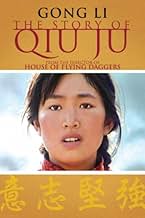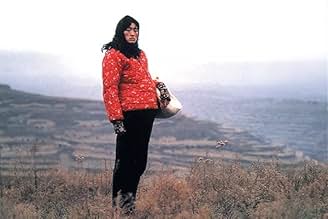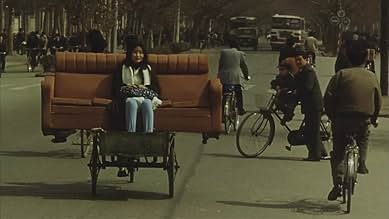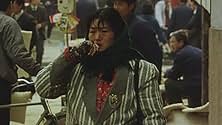AVALIAÇÃO DA IMDb
7,5/10
7 mil
SUA AVALIAÇÃO
Adicionar um enredo no seu idiomaA peasant woman seeks justice after the headman of her village has kicked her husband in the groin.A peasant woman seeks justice after the headman of her village has kicked her husband in the groin.A peasant woman seeks justice after the headman of her village has kicked her husband in the groin.
- Direção
- Roteiristas
- Artistas
- Prêmios
- 19 vitórias e 9 indicações no total
- Direção
- Roteiristas
- Elenco e equipe completos
- Produção, bilheteria e muito mais no IMDbPro
Avaliações em destaque
Probably my least favorite Zhang Yimou film. Oh, it's not bad. It's pretty good, to tell the truth. But it's the kind of film where you get the point right away and you have to spend 100 minutes watching the filmmaker stumble toward the foregone conclusion. Gong Li plays the title character, a hugely pregnant woman. Her husband just got kicked in the nuts by their farming community's chief, and Qiu Ju wants an apology. Unfortunately, none of the officials she takes the case to can actually force the guy to apologize. They can make him dole out monetary compensation, but that's not good enough for Qiu Ju. Every time she doesn't get the results she wants, she attempts to go to a higher level of authority. It's an amusing situation, but the film kind of plods along slowly. I won't demand Zhang Yimou stick to his wonderful visual talents, but it is disappointing how mundane this film looks and feels. The worst crime perhaps is that Gong Li isn't given much acting to do. I love the final look on her face when the film ends, but I think pretty much anyone could have played Qiu Ju. I know, it sounds like I hated it, but I didn't. I just wasn't overly impressed with it, despite its obvious qualities.
10jtur88
I've visited rural China, and this is the most realistic film I have ever seen. I was awestruck at how well this film captures exactly the China that a modern visitor to the country would see. Not just the landscapes---the people are portrayed just as they are. I carry a copy of this film with me to show my friends and family--I know of no better way to illustrate the China that I actually saw. In addition, as a film-goer, I loved this film for its austere simplicity of production. I found myself wondering how many of the people who appeared on the screen were actually actors---as opposed to just having a candid camera imposing itself into their daily lives. I loved the scene in the office where an official was issuing a marriage license to a young couple---this was a spine-tinglingly poignant scene that, to me, underscored the genuine humanity that would seem so impossible in such a country---a humanity that is real. The Chinese are lovely, gentle people, and it was a delight to see a film that accurately reflects this character.
Zhang Yimou's "The Story of Qiu Ju" is not a masterpiece as is his film "Raise the Red Lantern." It doesn't have the epic qualities of "To Live" nor is it as visually stunning as "The Road Home." But "Qiu Ju" may well be Yimou's most thought provoking film, leaving you pondering the messages a long time after the film has ended.
Qiu Ju's husband has been kicked ("where it counts") by the village chief. The only bit of justice Qiu Ju wants is an apology. It seems to be a simple enough request, but her search for the apology proves to be elusive as she encounters a legal system more interested in its own red tape than in the needs of ordinary people.
But this is not "Erin Brockovich" where the sides of "good" and "bad" are easily defined. The people in the legal system Qiu Ju encounters are genuinely decent folks. They are also, unfortunately, a bit clueless. And Qiu Ju is not beyond reproach herself. At the conclusion of the film even she is realizing that she has pushed the matter too far.
Just how far should one go to seek justice in this world? Even if you are totally in the right, does there come a time when you must let the matter rest for your own sake as well as everybody else's? There are no easy answers.
This is another great performance by Gong Li in the title role. She may be one of the most beautiful women in the world, but here she is not above playing "dowdy." And as usual, Zhang Yimou is nearly flawless in his direction. He gives a wonderful tip of the hat to the late French director Francois Truffaut in the end, echoing that famous final shot of Truffaut's "The 400 Blows."
But this is a film that will stick with you well past that last shot.
Qiu Ju's husband has been kicked ("where it counts") by the village chief. The only bit of justice Qiu Ju wants is an apology. It seems to be a simple enough request, but her search for the apology proves to be elusive as she encounters a legal system more interested in its own red tape than in the needs of ordinary people.
But this is not "Erin Brockovich" where the sides of "good" and "bad" are easily defined. The people in the legal system Qiu Ju encounters are genuinely decent folks. They are also, unfortunately, a bit clueless. And Qiu Ju is not beyond reproach herself. At the conclusion of the film even she is realizing that she has pushed the matter too far.
Just how far should one go to seek justice in this world? Even if you are totally in the right, does there come a time when you must let the matter rest for your own sake as well as everybody else's? There are no easy answers.
This is another great performance by Gong Li in the title role. She may be one of the most beautiful women in the world, but here she is not above playing "dowdy." And as usual, Zhang Yimou is nearly flawless in his direction. He gives a wonderful tip of the hat to the late French director Francois Truffaut in the end, echoing that famous final shot of Truffaut's "The 400 Blows."
But this is a film that will stick with you well past that last shot.
Most Chinese movies are about victims of the culture or political system or how beautiful you men and women are kept apart or forced together by forces outside their control. This movie is completely different. It is a simple story about the ordinary Chinese people you can meet on the street and in their homes today and their ordinary lives. It is an amazingly accurate portrayal, unlike anything I have seen before. I only spent 3 weeks in China, but this movie brought back the feel of China, its people, and organizations.
Qxi Ju wants an apology from the Chief of the commune for kicking her husband in the groin. This is a story about her travels from the commune to the big city to try to get action from various bureaucracies. Although she is treated kindly and with much respect by the bureaucrats, she never gets exactly what she wants. It is fun to watch naive country girl Qxi Ju quickly learn about master doing things in the big city.
For me, the plot in this movie is secondary. It is each of the simple scenes that make this movie wonderful: The doctor's office is heated by a wood stove and the doctor chops the wood and feeds the fire. Qxi Ju's sister gives here a ride to town on the back of her bicycle on a snow covered unpaved road. They use dried chili peppers to trade for money to get a ride to the next town. Qxi Ju negotiates for the price of each thing she buys. The scenes all seem so realistic and beautifully photographed.
Yimou Zhang also made "Raise the Red Lantern" which gets higher praise, but that movie is about a world that is harder for me to relate to. This movie is like real life and real people and China today.
Qxi Ju wants an apology from the Chief of the commune for kicking her husband in the groin. This is a story about her travels from the commune to the big city to try to get action from various bureaucracies. Although she is treated kindly and with much respect by the bureaucrats, she never gets exactly what she wants. It is fun to watch naive country girl Qxi Ju quickly learn about master doing things in the big city.
For me, the plot in this movie is secondary. It is each of the simple scenes that make this movie wonderful: The doctor's office is heated by a wood stove and the doctor chops the wood and feeds the fire. Qxi Ju's sister gives here a ride to town on the back of her bicycle on a snow covered unpaved road. They use dried chili peppers to trade for money to get a ride to the next town. Qxi Ju negotiates for the price of each thing she buys. The scenes all seem so realistic and beautifully photographed.
Yimou Zhang also made "Raise the Red Lantern" which gets higher praise, but that movie is about a world that is harder for me to relate to. This movie is like real life and real people and China today.
Gong Li, China's top actress in the 1990s (deservedly so), plays a naive but determined innocent, a young married woman from a remote farming village who wants nothing more than to have the village elder apologize to her husband for kicking him in a fit of anger. The bureaucratic nightmare she endures, making repeated trips to "the city" to seek justice, exposes her to a system she didn't know existed, a completely convoluted and impregnable one that operates solely by standards and practices, totally devoid of compassion or an understanding of the people it governs.
This is a small film, an earlier work by master Chinese filmmaker Zhang Yimou (To Live, Ju Dou), but what really makes it work is Gong as Qiu Ju. Every effect of this effectless society registers on her face, mostly in the form of surprise at the promises unkept and disappointment at the lack of concern by officials who are supposed to be responsible to "the people." She makes us care deeply about Qiu Ju, even though we may not be able to identify directly with her circumstances, but even beyond this, she makes these provincial circumstances universal by being the everywoman, someone who just wants the people in charge to do what's right without it necessarily having any adverse impact on themselves. Gong's ability to inject political situations with sincere human emotion has made her an ideal representative of the message running through all of Zhang's films (she has appeared in several of them), but beyond this, she simply is a great actress who should eventually become as world renowned as Joan Chen once was.
What makes this film even more prescient is how well many Americans may identify with the nightmares presented by a government hierarchy overstuffed with "I just work here" bureaucrats. And the ending is infused with a poignant irony that will hit home with anyone who has, in their own lives, found that time heals all wounds.
This is a small film, an earlier work by master Chinese filmmaker Zhang Yimou (To Live, Ju Dou), but what really makes it work is Gong as Qiu Ju. Every effect of this effectless society registers on her face, mostly in the form of surprise at the promises unkept and disappointment at the lack of concern by officials who are supposed to be responsible to "the people." She makes us care deeply about Qiu Ju, even though we may not be able to identify directly with her circumstances, but even beyond this, she makes these provincial circumstances universal by being the everywoman, someone who just wants the people in charge to do what's right without it necessarily having any adverse impact on themselves. Gong's ability to inject political situations with sincere human emotion has made her an ideal representative of the message running through all of Zhang's films (she has appeared in several of them), but beyond this, she simply is a great actress who should eventually become as world renowned as Joan Chen once was.
What makes this film even more prescient is how well many Americans may identify with the nightmares presented by a government hierarchy overstuffed with "I just work here" bureaucrats. And the ending is infused with a poignant irony that will hit home with anyone who has, in their own lives, found that time heals all wounds.
Você sabia?
- CuriosidadesThe Chinese title is "Qiu Ju Files a Lawsuit"
Principais escolhas
Faça login para avaliar e ver a lista de recomendações personalizadas
- How long is The Story of Qiu Ju?Fornecido pela Alexa
Detalhes
Bilheteria
- Faturamento bruto nos EUA e Canadá
- US$ 1.890.247
- Fim de semana de estreia nos EUA e Canadá
- US$ 25.785
- 18 de abr. de 1993
- Faturamento bruto mundial
- US$ 1.890.247
- Tempo de duração
- 1 h 40 min(100 min)
- Cor
- Proporção
- 1.85 : 1
Contribua para esta página
Sugerir uma alteração ou adicionar conteúdo ausente























